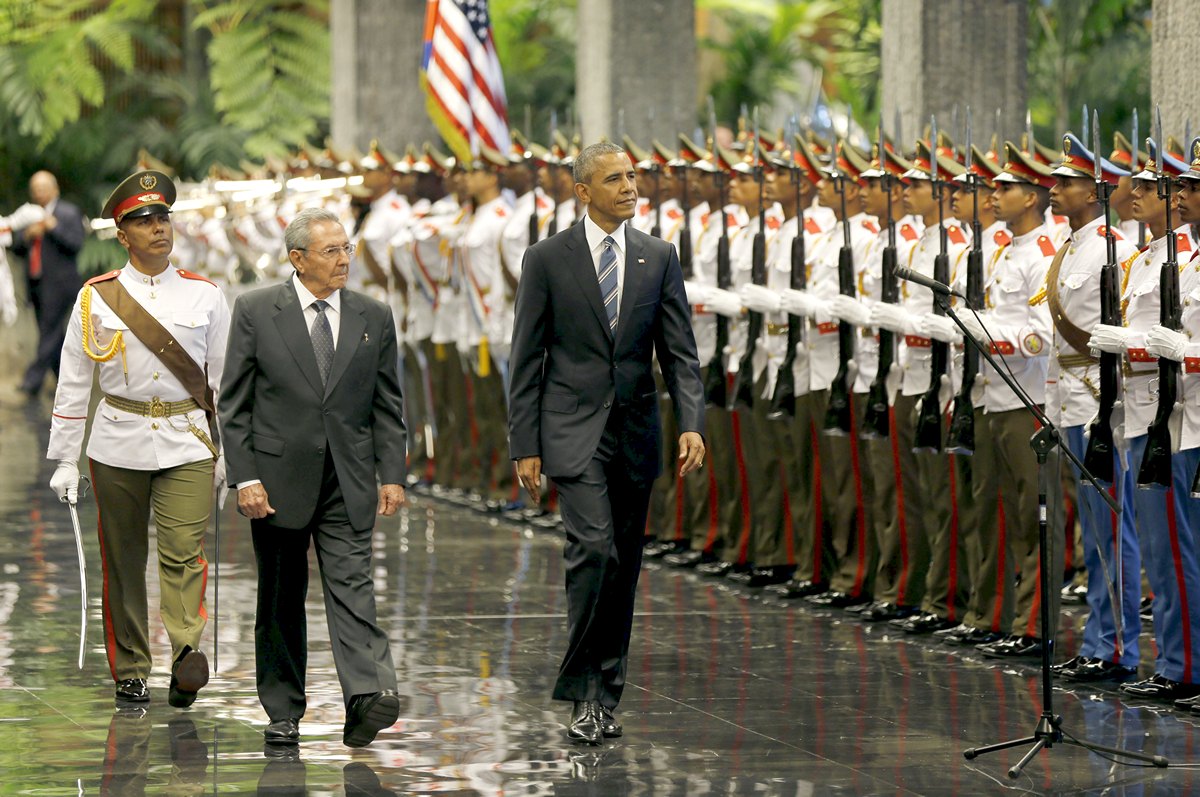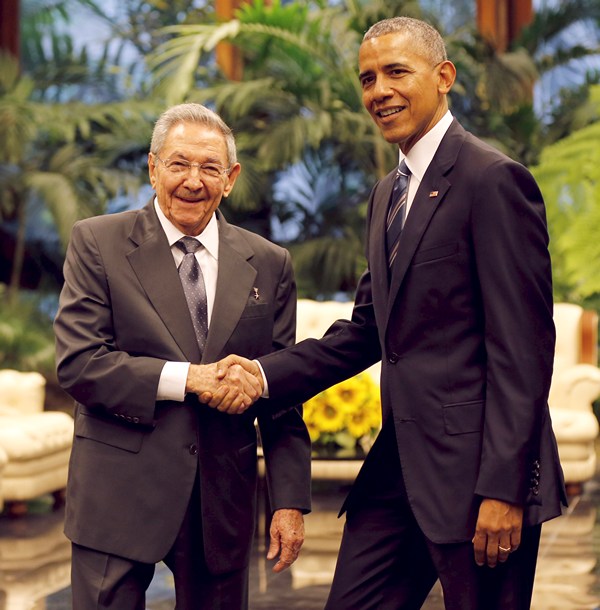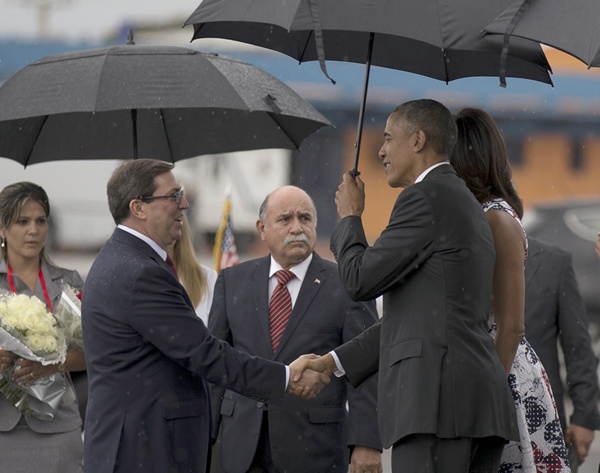
|
March 26, 2016 - No. 13 In Memory of
Secwepemc Elder
Terrorist
Attacks
in
Belgium,
Turkey
and
Iraq In Memoriam Secwepemc Elder Wolverine William Jones Ignace
"Tuesday, March 22nd, 2016 our Secwepemc War Hero and Elder Wolverine William Jones Ignace passed on to the Spirit World at his home in Secwepemc Territory. Wolverine earned his Battle Honours at Ts'Peten, Gustafsen Lake Siege in 1995, where he and other Warriors successfully survived a military attack launched by the Canadian government, in defence of his unsurrendered Secwepemc Lands. He leaves with us a great legacy of Indigenous Resistance, Struggle and Victory. He is widely respected and loved, not only by his family, community and Secwepemc Nation, but throughout the World as well. Wolverine lit the fires of Freedom in the hearts and spirits of countless Peoples fighting for Indigenous Lives, Lands and Rights. Wolverine will be greatly missed by Indigenous Warriors on the frontlines from Alaska to South America. "Wolverine sincerely expressed a deep will for the Peoples to continue the important and crucial work in fighting for our unceded Secwepemc Territory, including the demand for a National Inquiry into the siege at Gustafsen Lake. As well as to carry on his Nourish the Nation Garden, to feed the frontlines." -- Ts'Peten Defence Committee[1] Wolverine rose to become an historic personality in the fight against colonialism, racism and the lawlessness of the Canadian state with his physical and legal defence of Secwepmec claims to sovereignty, for land title as well as jurisdiction over their lands during the 1995 Gustafsen Lake siege and later during the criminal trials and appeals arising from the illegal, racist and colonial assault by the Canadian state against the Ts'Peten Defenders. For many years before 1995 Wolverine studied profoundly the lawful rights of Indigenous peoples and traveled widely speaking about this subject to Indigenous peoples throughout the Americas, even to the United Nations. He repudiated the unlawful European colonial assertions of "right of discovery" and "terra nullius" used to wipe out the inhabitants and annex the lands of Indigenous countries throughout the "Americas." He upheld and vigorously argued for the sovereignty of all the Indigenous peoples, for their land title with full juridical authority over them. When the BC NDP government in 1995 headed by Premier
Michael
Harcourt and Attorney General Ujjal Dosanjh ordered some 400 RCMP
to surround a small Sundance Ceremony comprised of 17 Indigenous
people including children and four non-Native people on a grassland
next to Gustafsen Lake, Wolverine had already submitted a court
action on the question of title, sovereignty and jurisdiction,
which went even further than the Delgamuukw
case (Supreme Court
1997). The rancher who claimed a lease over the land where the
Sundance was in progress had never made an issue of their
presence in previous years. It was only made an issue after
Wolverine filed his claim and the state got involved to defeat
the claim. How the rest of the story played out indicates it was
a provocation to criminalize the legal fight over the question of
sovereignty and jurisdiction.
The story of what took place at Gustafsen Lake is still not known well enough in BC and throughout Canada or the world. Four hundred RCMP fired over 70,000 rounds of ammunition at the camp over several days, luckily only wounding one person. They set a mine which blew up a pick-up truck used by the camp to fetch water. The Canadian Armed Forces Joint Task Force 2 entered the siege through an illegal arrangement between Dosanjh and the Chrétien Liberal government of the day. The media in collaboration with RCMP Sergeant Peter Montague, infamous for his videotaped remark "smear campaigns are our speciality," bombarded the public with lies and disinformation day in and day out. The army lent the RCMP four "Buffalo" armoured vehicles and used helicopters against the land defenders in the name of "suppressing terrorism," all at public expense. Wolverine was subsequently brought before a heavily-armed court in shackles and placed in a bulletproof glass box as if he were a terrorist. In one of the most egregious travesties of justice ever seen in Canada, the court ignored the evidence and gave Wolverine an eight-year prison sentence.[2] This is why, although at the end of his days with cancer, Wolverine issued a call on the 20th anniversary of Gustafsen Lake for an official inquiry into the RCMP and government violation of federal, constitutional and international law in dealing with the lawful stand of Wolverine and his comrades that were defending unceded Secwepemc territory.[3]
Indeed, what stands out most prominently throughout the life and work of Wolverine was his persistent and principled stand that the annexation of Indigenous countries, lands and peoples by the Anglo-Canadian state violated the rule of law, domestic and international. He defended this courageous stand in 1997 in front of Appeals Court Justice Allan McEachern, who tried to persuade Wolverine and his co-defendant, James "OJ" Pitawanakwat, to abandon their appeal based on the rule of law -- sovereignty and jurisdiction -- and take up instead arguments based on self-defence and "colour of right" which McEachern strongly suggested would result in his being freed from his eight-year jail sentence. Wolverine would not budge and persisted with his legal argument based on jurisdiction. The BC Appeals Court rejected it; the Supreme Court of Canada refused to review it. Wolverine went back to prison. OJ fled to the United States and filed for political refugee status. Through the meticulous work of Dacajeweiah (Splitting the Sky) and his co-worker, Anthony Hall, Oregon Judge Janice Stewart ruled OJ was a political refugee from Canada. This strong slap on the face of the Canadian state was never appealed by Canada. His right to return to Canada remains one of the ongoing unresolved issues arising from the 1995 struggle. Wolverine's lifelong principled and unyielding defence of Indigenous nations' rights to sovereignty, land title and jurisdiction reminds us of the historical task to destroy "root and branch" the basis of Anglo-Canadian colonialism. This remains a major practical political task as we take up the renewal of the political process and engage in modern nation-building. Regardless of the population ratio of Indigenous peoples to non-Indigenous settlers now residing in Canada, a modern constitution must give pride of place to the principles for which Wolverine so persistently fought. Wolverine was a dearly beloved elder of the Secwepemc Nation, whose southern homeland straddles the South Thompson River, site of the largest sockeye salmon run in BC. An organic farmer as well as a fighter for Indigenous peoples' sovereignty and jurisdiction over their unceded lands, he and his wife Flo always brought abundant quantities of food from their organic gardens to the activists taking up their various land claim struggles against the resource monopolies and governments. They traveled far, such as in 1992 when they took food to the activists at the blockade of the Cree Nation at Wiggins Bay, Saskatchewan to stop clear cutting of their forests. The life work of Wolverine among many others of his generation in defence of Indigenous sovereignty, land title and jurisdiction, has made an important contribution to the younger generation as well as to opening the eyes of Canadians to the tasks that continue before us. The old Canada represented by the RCMP, the racist parliaments and eurocentric court system must give way to the new. Wolverine's life and work contributed to that fight for
the
new. May his spirit join that of his comrade and fellow fighter
Dacajeweiah (Splitting the Sky) and all the other Indigenous
freedom fighters of times past. May his spirit inspire
generations of new fighters for the human-centred Canada which is
striving to be born. Notes1. https://www.facebook.com/tspeten/ 2. Detailed accounts of these
historic moments can be
found
in The Autobiography of Dacajeweiah, Splitting the Sky, John
Boncore Hill, from Attica to Gustafsen Lake written with She
Keeps the Door (Sandra Bruderer) and at this website. 3. See TML Weekly, January 9, 2016. Terrorist Attacks in Belgium, Turkey and Iraq No to Both State Terrorism and
|
|
|
At the meeting both Presidents talked about areas of mutual interest in which both nations, despite their differences, can make progress.
At the end of the meeting, both presidents made statements to the national and foreign press. Castro praised the progress made in the re-establishment of diplomatic relations between Cuba and the United States but added that much more could be realized in Cuba-U.S. relations without the economic blockade.
"The blockade is the most significant impediment for the development of the Cuban people. That is why its elimination is essential for the normalization of relations," said President Castro.
President Castro said that he expects that the dramatic shift in the relationship between the two countries will be permanent.
"We agree that we have a long and complex path ahead of us but what is important is that we have started to take steps to build a relationship of a new kind, one that has never existed before between Cuba and the United States," Castro said.
"Today I affirm that we must practice the art of
civilized
coexistence, which means accepting and respecting differences and
not make them the centre of our relations, but instead promote
links that benefit both peoples and focus on what brings us
closer and not on what separates us," he added.
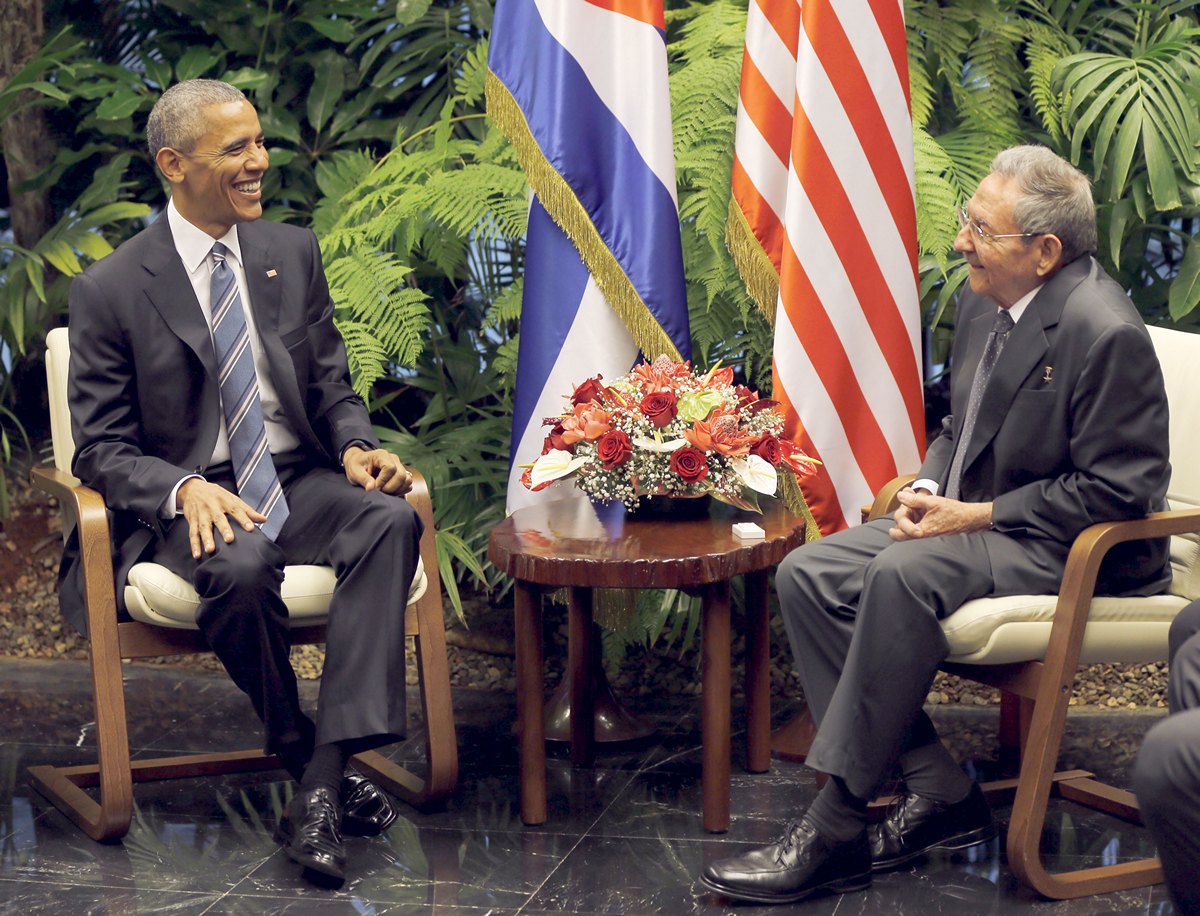
The Cuban leader thanked the Obama administration for reiterating its position that the blockade be lifted, but said it has not been enough. "We oppose the double standard on human rights as well," the Cuban President added.
Meanwhile, Obama thanked Castro for his hospitality, and said that it would have been "unimaginable" for more than 50 years to hear a U.S. president speak from Cuba.
Obama recognized the "extraordinary" achievements of Cuba in sectors such as health and education, while he reaffirmed steps taken by his administration to strengthen the countries' ties despite the ongoing economic, commercial and financial blockade, imposed on Cuba for over half a century. In this context, he expressed that the future of Cubans will be decided by Cubans themselves and no one else. "Cuba has the right to be sovereign," he pointed out.
After his meeting with Raúl Castro, Barack Obama spoke with Cuban and U.S. entrepreneurs, including representatives of the state and cooperative sectors, at a business forum organized by the Chamber of Commerce of the Republic of Cuba. As the two parties explored opportunities for commercial exchanges, Obama acknowledged the changes in Cuba as part of updating its economic and social model, which includes "a branch generating employment," i.e. the opening of self-employment. Expressing his confidence in the potential of Cubans, Obama acknowledged the high level of education, the capacity to create and the wit of Cubans. He called these attractions which would draw investment from U.S. sectors, among them the Cuban-American community.
Obama said that his country wants to become a trading partner of Cuba, and pointed to the authorization of his government for the companies Cleber LLC, Starwood Hotels and Airbnb, which facilitates home rentals, to establish a presence in Cuba.
Cuba has first class physicians and nurses, the U.S. President said while referring to the remarks of a forum participant in the field of health care. Alluding to Cuba's medical potential, he stated that "...we agreed with the Cuban government to establish and develop joint scientific cooperation in the medical field."
"I have always believed that knowledge is something that has to be shared, no matter the political system we may have. Diseases are the same. Therefore, working together to find solutions is something very important," he said.
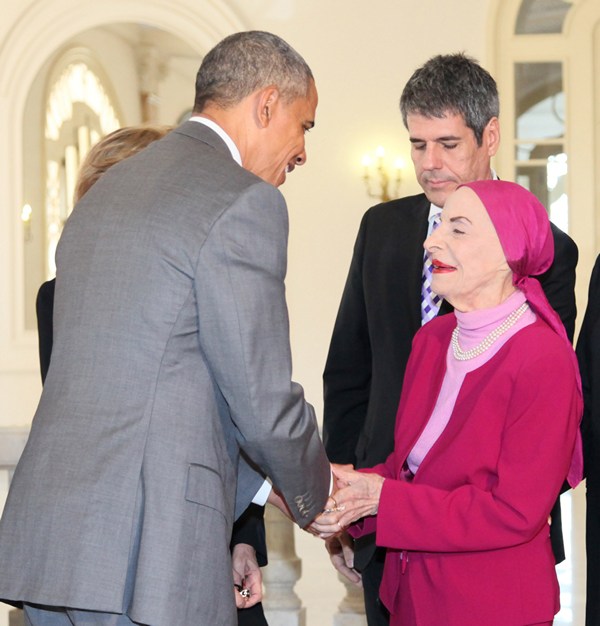 The last day of Obama's
visit in Cuba was marked by
a
speech to representatives of Cuban civil society in the Gran
Teatro de La Habana Alicia Alonso. Minutes before giving his
speech Obama greeted the prima
ballerina assoluta Alicia
Alonso.
The last day of Obama's
visit in Cuba was marked by
a
speech to representatives of Cuban civil society in the Gran
Teatro de La Habana Alicia Alonso. Minutes before giving his
speech Obama greeted the prima
ballerina assoluta Alicia
Alonso.
In their brief encounter, Obama expressed his admiration for Alonso's work and his satisfaction to finally meet her in person, noted Pedro Simón Martínez, director of the National Museum of Dance, speaking to Granma.
For her part, Alonso, also Director of the National Ballet of Cuba noted that the meeting "was marvelous, above all because he is the first figure I have received at the Gran Teatro since it was renamed in my honour," for which she felt "very happy."[2]
At a speech delivered at the Gran Teatro the U.S. President shared his vision of the new possibilities opening in the relations between both countries, and said that the American and Cuban people have shared values, besides being united by historical and cultural ties. Besides other things, he praised the Cuban internationalist doctors, whose solidarity assists disadvantaged populations in dozens of countries around the world. In addition to the recognition of the doctors, the result of a system of universal free public health, the U.S. President celebrated the Cuban talent, which in his words is derived from an educational system, similar to the health sector, "that values all boys and girls."
Previously, the U.S. President welcomed the innovative
and
creative capacity of the Cuban people which, he said, is
recognized and admired in the United States. Obama said that this
prompted the decision of his administration to change the policy
of isolation which the U.S. imposed on Cuba for more than half
a century.
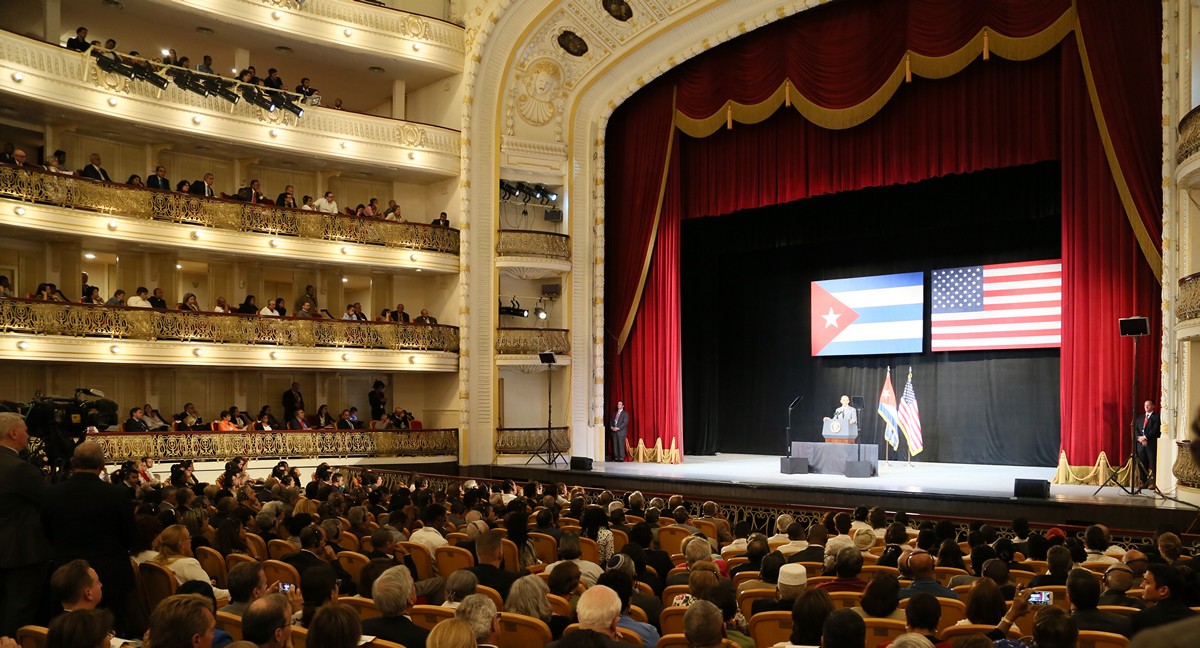
Another factor was the recognition that such a policy, an important part of which is the economic, commercial and financial blockade, is not conducive to U.S. interests and does not reflect the historical and cultural ties that unite both countries.
Cold War policies make no sense in the twenty-first century, Obama stressed, while urging Cuban and U.S. citizens not to fear changes, but welcome them and help promote a civilized coexistence.
Following the meeting in the Gran Teatro, Obama and Castro attended a friendly match between Cuba's national baseball team and the Tampa Bay Rays (representing U.S. Major League Baseball) the last event of the U.S. President's visit. The Rays defeated the Cuban national team 4-1.[3]
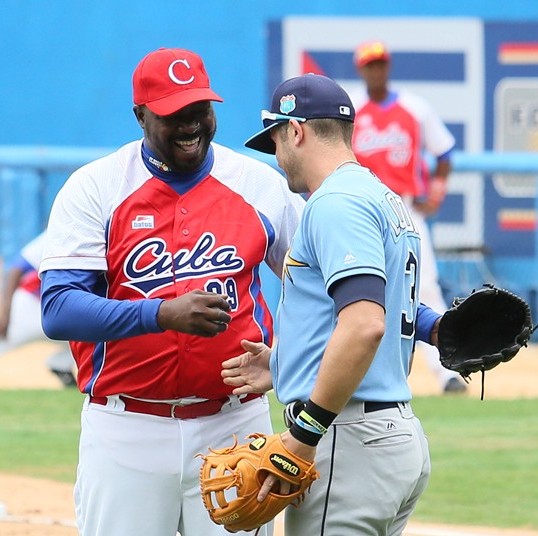
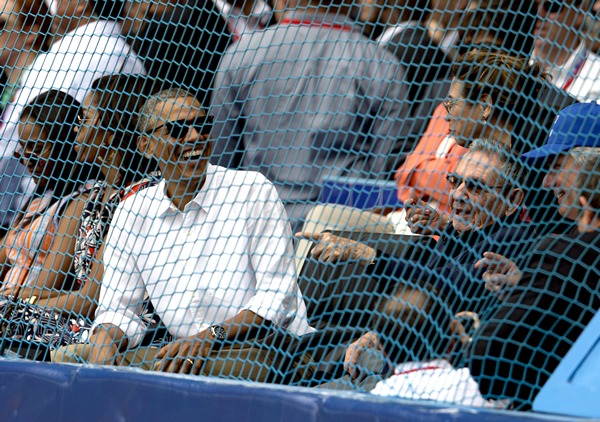
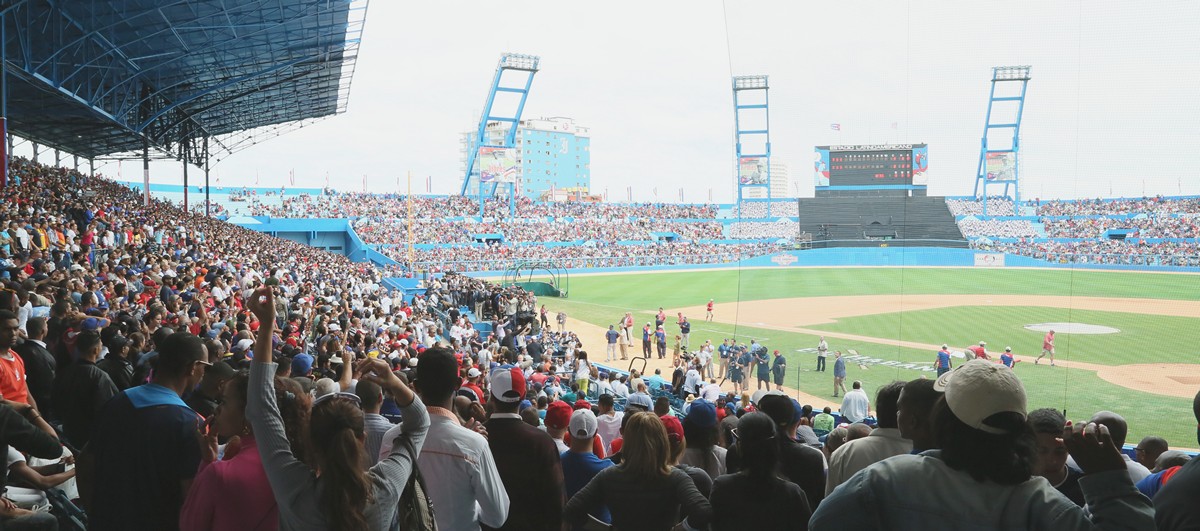
Before leaving Havana's Latinoamericano stadium, Obama held a last brief interview with ESPN where he again admitted that the old U.S. policy to try to isolate Cuba was useless.
"In my opinion, if you spend half a century doing something and it does not work, you have to change something," he said. He mentioned that he favoured increasing the possibilities for U.S. citizens to freely visit Cuba, something currently impossible due to the U.S. blockade. He also recognized that the isolation has only strengthened Cubans, whose talent, skills and potential he emphasized, as he had in the morning during his speech to the civil society organizations at the Gran Teatro.
This visit, the first by a U.S. President in 88 years, is considered an important step on the road towards the normalization of bilateral ties, for which the lifting of the blockade on the island and the return of the territory occupied by the Guantánamo Naval Base will be determining factors.
Notes
1. Extract from Remarks by Barack Obama upon arriving in Cuba, March 22
"¡Hola desde Cuba!
[...]
"I've come to Havana to extend the hand of friendship to the Cuban people. I'm here to bury the last vestige of the Cold War in the Americas and to forge a new era of understanding to help improve the daily lives of the Cuban people.
"There continue to be real and important differences between our governments, including profound differences on the way to promote safety, security, opportunity, and human rights. But there's so much Americans and Cubans share -- our cultures and passions, our hopes for the future, not to mention a love of baseball.
"I know one visit, and one president, cannot erase the decades of history that have left so many Cubans in poverty or exile. But sometimes the most important changes begin with the smallest step. I believe in the Cuban people and their desire to build a future of their own choosing. And I believe that changing the way we do things between our countries will, over time, help make that possible.
"So I'm looking forward to meeting and hearing directly from Cubans from all walks of life. And I'm confident that, working together with the Cuban people, our two countries can begin a new journey together that delivers progress for both our peoples." ("We've Reached Havana," Barack Obama, whitehouse.gov, March 21, 2016)
2. In September 2015, the Council of State made the extraordinary decision, in recognition of Alonso's contribution to Cuban and global culture, to rename the establishment the Gran Teatro de la Habana Alicia Alonso.
The playhouse located on Prado and San Rafael Streets, reopened its doors -- after undergoing a three-year restoration -- on January 1, 2016, with a gala by the National Ballet, in commemoration of the 57th anniversary of the triumph of the Revolution.
Cuba and the U.S. share a long history of ballet. Alicia and Fernando Alonso traveled to the United States in 1937 to continue their education and begin their careers as professional ballet dancers.
Years later, on October 28, 1948, Alicia fulfilled her dream of creating a professional ballet company in Cuba with the support of important figures from U.S. ballet.
In recent years the National Ballet has toured 38 U.S. cities, while numerous choreographers from that country have created works for the company's repertory.
3. Transcript of Obama's remarks to ESPN prior to attending the baseball game:
"Today I'm taking Michelle and our girls out to a ballgame. That's something Americans do all the time, but this game is something extraordinary.
"It's the first exhibition game between a major league team -- the Tampa Bay Rays -- and the Cuban national team in 17 years. It's only the second time an MLB team has visited Cuba since 1959. And most importantly, it's a symbol of the bonds between Americans and Cubans despite decades of isolation -- a small step that shows that our nations can begin to move beyond the divisions of the past and look toward a future of greater connections and cooperation between our countries.
"One of the things we share is our national pastimes -- la pelota. As the quote from 'Field of Dreams' goes, 'the one constant through all the years ... has been baseball.' That's as true in America as it is in Cuba. Whether it's the middle of an Iowa cornfield or the neighborhoods of Havana, our landscapes are dotted with baseball diamonds. Our kids grow up learning to run the bases and count balls and strikes. And many of our greatest ballplayers have taken the field together.
"Since 1959, about 100 players from Cuba have played for MLB clubs. Four Cuban-born players are enshrined in Cooperstown, including Cincinnati Reds great Tony Pérez. And just looking at one team -- say, my Chicago White Sox -- you can see Cuba's imprint through the generations. One of the White Sox's all-time greats, the late Minnie Miñoso, was born near Havana. José Contreras and Orlando 'Duque' Hernández helped bring a World Series trophy to the South Side back in 2005. And one of our best players today -- and one of the game's best sluggers -- also comes from Cuba: first baseman José Abreu.
"Baseball in Cuba has played a part in America's broader history as well. In 1947, the Brooklyn Dodgers and their farm club, including Jackie Robinson, spent spring training in Havana. Before he broke Major League Baseball's color barrier, Jackie took the field at the famed Estadio Latinoamericano for exhibitions against both American and Cuban teams. It's the same stadium where we'll watch today's game. And it will be an honor to watch with Jackie's wife, Rachel, and their daughter, Sharon, who are here as part of our delegation.
"That's what this visit is about: remembering what we share, reflecting upon the barriers we've broken -- as people and as nations -- and looking toward a better future. Because while I will not ignore the important differences between our governments, I came to Cuba to extend the hand of friendship to the Cuban people.
"They're the reason I cast off the failed, Cold War-era policy that left so many Cubans in conflict, exile and poverty in favor of a new course. They're why our governments are now cooperating on health and education initiatives. They're why we're helping families connect by restoring direct commercial flights and mail service. And they're why we're expanding commercial ties and increasing the capacity of Americans to travel to do business in Cuba.
"These steps, and my visit here this week, are just small steps in a long road ahead. But I believe the American people and the Cuban people can make this journey as friends, as family and, yes, as baseball fans. ¡Pleibol!"
(With files from news agencies. Photos: MINREX, CubaDebate)
At Least Three Glaring Holes Left After
Obama's Visit to
Cuba
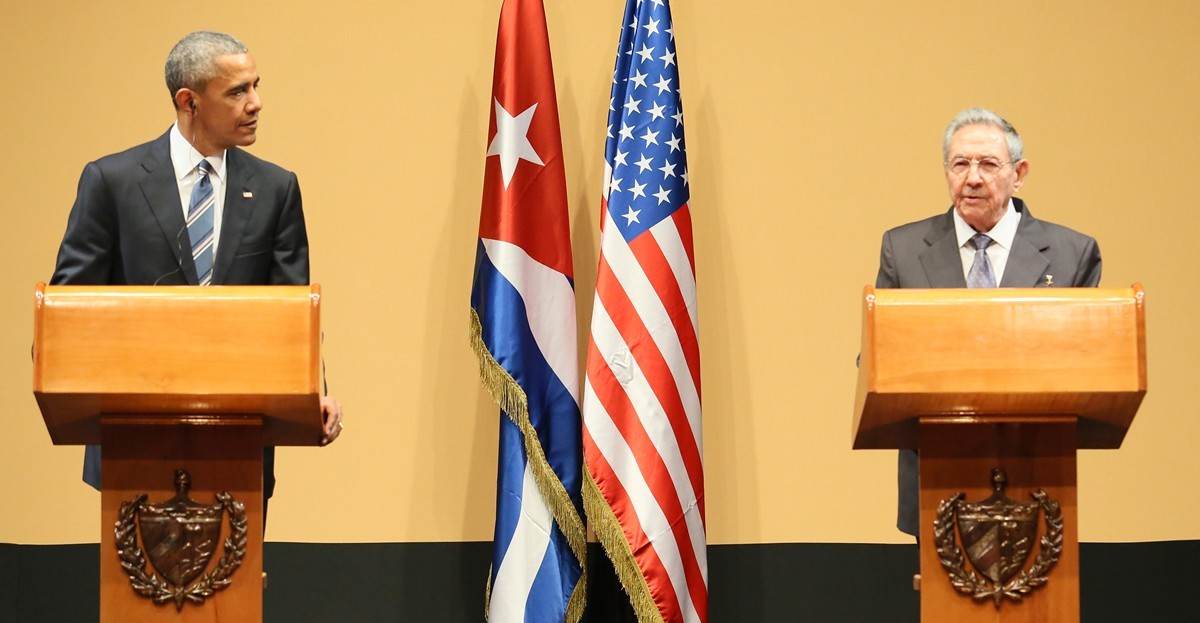
Joint press conference by Presidents Obama and Castro, Havana, March
21, 2016. (MINREX)
Hailed by much of the media as a success, the visit of the U.S. president to Cuba left many questions unanswered.
Liberals around the world have hailed the historic visit of U.S. President Barack Obama as an out-and-out success for the outgoing leader.
The New York Times paints a picture of Obama as magnanimous and progressive -- a symbol of democracy amidst a struggling regime. The newspaper tried to suggest that Obama gave his Cuban counterpart, Raúl Castro, friendly tips.
"Throughout Mr. Obama's visit, a dynamic of cautious warmth pervaded his interactions with Mr. Castro, including when the younger American president appeared to coach the older Cuban through his first genuine news conference on Monday."
In reality, Obama's trip was a victory for an unyielding Cuba, whose people and leaders never surrendered in the face of a decades-long U.S. onslaught. It marks the first time in 88 years that a U.S. president has touched Cuban soil. It is an admission by the Obama administration that U.S. policy toward Cuba has failed. Yet in spite of all this, some raw wounds in diplomatic relations remain undressed.
Cuba insists that before there is a normalization of relations between the two countries, the U.S. must end its 55-year-old blockade; return the illegally-held Guantanamo Bay; change its immigration policies toward Cuban migrants; stop transmitting radio propaganda into the country and attempting to build an opposition; and finally stop all attempts at regime change.
Despite Obama's good-sportsmanship while participating in a comedy skit, none of these subjects were dealt with during the fleeting trip.
Not to mention that Obama left Cuba en route to Argentina during the 40th anniversary of the bloodsoaked U.S.-backed coup there and that he recently renewed a decree declaring Cuba's close ally Venezuela a "threat," and shows no signs of improving relations with the South American oil-producing country.
Illegal Blockade Continues
The U.S. president failed to change policy over the illegal blockade, or apologize for the crippling financial damage it has caused over more than half a century.
"It's time to lift the embargo, but even if we lifted the embargo tomorrow, Cubans would not realize their potential without continued change here in Cuba," Obama said in a press conference on March 22.
An admission that the blockade needs to be lifted is one thing -- enacting it is another.
Just last month, Obama renewed a 20-year-old state of national emergency to continue to administer the blockade against Cuba, prolonging the economic policy begun under President Bill Clinton in 1996, using emergency powers sanctioned by Congress.
The decree bans ships and planes from the U.S. from entering Cuban waters or airspace without government permission, and requires the president to renew the emergency powers annually.
According to the United Nations, the U.S. blockade has cost Cuba more than U.S.$117 billion, deprived Cubans of life-saving medicines, and caused additional hardships for millions of Cubans.
Abuses at Guantanamo Bay
Obama did not acknowledge the horrifying human rights abuses committed by U.S. citizens at Guantanamo Bay detention facility.
While Cuban President Raúl Castro was confronted by U.S. reporter Jim Acosta over Cuba's "political prisoners," Obama was spared uncomfortable questions over violations of human rights committed by the U.S. on Cuban soil.
Last month, Obama presented a long-awaited plan to close the controversial prison.
But Guantanamo entered its fifteenth year of operation in 2016. According to activists, nine prisoners have died in the facility since it opened on January 11, 2002.
Prisoners at the infamous U.S.-run prison have asked authorities to halt the inhumane practice of force-feeding hunger strikers.
Former prisoners, many held for years without charge, recount experiences of waterboarding, prolonged isolation, and other physical and psychological torture.
"They did things to us that is against humanity, against human rights and against Islam. I cannot even talk about that and I will not talk about it," elderly former inmate Haji Nasrat Khan told the BBC in 2014.
U.S. Immigration Policy
Obama also declined to address his country's immigration policy towards Cubans, which encourages them to pack up and leave their country for the U.S. with the promise of guaranteed legal residency and eventually citizenship. Cubans are the only people given such a privileged status by the U.S.
The practice is cruel: the U.S. itself, with its economic and trade restrictions, created much of the poverty that Cubans try to flee, while at the same time urging Cubans to leave their homeland.
Furthermore, it is extremely dangerous: scores of Cubans have been killed making the treacherous journey from Cuba to the U.S., sometimes drowning in the Gulf of Mexico, or subjected to the whims of human traffickers if taking an indirect route through other Latin American countries, like Mexico.
In the same vein, the U.S. president met with Cuban dissidents on [March 22], themselves a product of interference by U.S. agencies.
Despite the thawing of diplomatic relations, the U.S. government continues to provide financial "assistance" to individuals and groups dedicated to "regime change" in Cuba.
Projects have included the launch of a social media network, ZunZuneo, to fuel opposition to the government, and the infiltration of hip-hop movements. USAID spent more than two years trying to infiltrate Cuba's hip-hop movement, seeking to exploit the country's thriving cultural scene.
(March 22, 2016)
Obama in the Grand Theatre or
Obama's Grand Theatre in
Havana?
Cuba, Latin America and the world listened with great expectations to Barack Obama's conciliatory, intelligent and seductive speech at the Grand Theatre of Havana on March 22. It was not the first time during his visit that he used a speech to direct himself to Cubans via national television, but it was the only occasion since arriving on the island two days earlier when the President of the United States did not share the stage with anyone and had the floor all to himself.
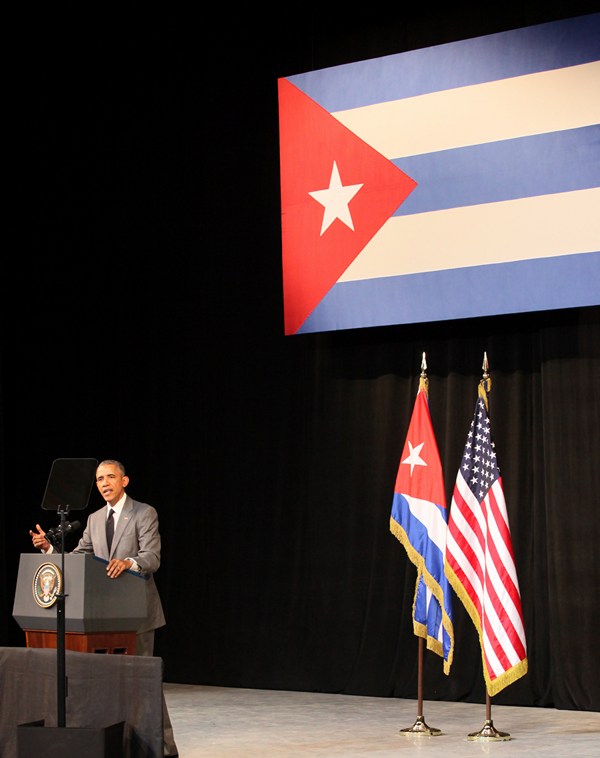 In keeping with the
political culture he represents, and the
way things have been taking place since he set foot in Havana,
once more nothing was left to chance, and more precisely, the
teleprompters brought from Washington -- the same ones used for
recording his dialogue with Cuba's most popular comic? -- kept him
on track from all sides of the stage with a carefully crafted
speech.
In keeping with the
political culture he represents, and the
way things have been taking place since he set foot in Havana,
once more nothing was left to chance, and more precisely, the
teleprompters brought from Washington -- the same ones used for
recording his dialogue with Cuba's most popular comic? -- kept him
on track from all sides of the stage with a carefully crafted
speech.
For an attentive member of the audience, a couple of people seated within the group of 40 Congress people who travelled from the U.S. for the occasion could be clearly recognized every time the speaker's words were to be applauded. This group of legislators, and the U.S. delegation that accompanied the President during his visit, were the only ones who applauded the many times his intervention went in the direction of offering patronizing advice, or worse, of more or less disguised interference.
A few seconds before starting, a stagehand hurriedly placed the shield with the bald eagle in front of the podium, as if it was necessary to have a predominant symbol between the Cuban and U.S. flags located upstage and in front of the audience.
As could be expected, the beginning was dedicated to a condemnation of the terrorist attacks that had just been committed by the Islamic State in Belgium and the commitment to "do everything necessary" to "bring those responsible to justice." But, as expected, not even that terrible act moved the speaker to mention the 3,478 Cubans who have died as victims of the terrorism waged, financed and encouraged from the United States against the country that, in his own words, gave him along with his family and his delegation a "warm welcome," much less, talk about the total inaction of the government he heads "to bring to justice those responsible" for such crimes.
Several times, however he resorted to storytelling, which the writer Christian Salmon defines as the "machine for fabricating stories and formatting minds," using personal stories with a political intent to present the Cuban Revolution as a thing of the past. And so he presented us with incontestable truths: that his father arrived in the U.S. in 1959 and that he was born the same year as the CIA invasion that was defeated at the Bay of Pigs, to cover up that events such as the kidnapping of Elián González and the unjust imprisonment of the Cuban Five took place in the 21st century and were experienced by the youngest generations of this island.
But we must acknowledge that there also was praise: Any intelligent person -- which Obama is -- knows that criticism is easier to accept if it is preceded by praise. Our doctors and athletes were applauded, always as individuals, without recognizing, much less questioning, the fully operational programs and regulations the U.S. government has put in place to deprive us of them.
Some opposing word pairs were emphasized during the speech (youth-history, state-individual, government-people, past-future) in a divisive strategy directed towards Cuban society, in which storytelling returned. He referred to successful immigrant "entrepreneurs," whose example our guest thinks we should and can follow, beginning with the "change" that he no longer is imposing on us, but suggesting to us, based on our own compatriots who have taken advantage of the "opportunities" that U.S. capitalism offers and what some of those who spoke to him the day before told him when he assumed the role of Santa Claus in a brewery in Havana. By the way, the word "change" was used 14 times in the speech.
What reality teaches us is that for every success there are still thousands on the way, and that every economic triumph in today's world most of the time means the hopes of many being dashed. To encourage private enterprise in Cuba, when as a Harvard professor he knows that the biggest truth contained in the Communist Manifesto is that in practice it has been abolished for nine-tenths of humanity, is not exactly an act of honesty.
After going over some similarities between Cuba and the
U.S.,
he contrasted the two countries concerned using a key paragraph
in which democracy is presented as the monopoly of the U.S.
system, which it has tried to impose around the world; socialism is
synonymous with being closed and the Cuban state as one which has
hijacked all rights:
"Cuba has a one-party system, the United States a multiparty democracy; Cuba has a socialist economic model, the United States an open market; Cuba emphasizes the role and rights of the State, the United States is founded on the rights of the individual."
However, we should ask North Americans how many days its multiparty system would last if, like Cubans, they had the right to nominate and select their representatives from among their peers, without intermediaries of any party. Speaking in the same vein about democratization, the very same President for whom one day before there were only successful entrepreneurs and for whom the workers seemed not to exist, told us on stage at the Grand Theatre that in his country "the workers have a voice," omitting to note that in his country only 11 percent of employees are unionized.
Looking around us, to where the "system," the "democracy" and the "economic model" do not seem bad to the U.S. it turns out that the actual exercise of "the rights of the individual," despite being mentioned much more than in Cuba, is an illusion. As the historian Fernando Martinez Heredia says, though it represents a tremendous confusion, there might be some people who think that because Obama comes to Cuba, the material conditions of a large part of Cubans will improve.
No country in the proximity of Cuba is better off socially than this island, despite not being subject to an economic blockade. Far from it, they suffer from problems like structural violence, child labour and drug trafficking that do not even exist here. When the U.S. speaks of "empowering the Cuban people" what they are really referring to is the construction of a minority that, like in those other places, will administer the country for them in keeping with their interests. They now say they will not impose the discredited "regime change," although they have not withdrawn a single penny from the multi-millions they have dedicated to this. Now with their new policies they want to create the conditions for us to do it ourselves.
On June 4, 2009 Obama spoke at the University of Cairo, an emblematic city for Islam and the Arab world, and the entire Middle East. It was a grandiose speech for a president who had not been in office five months. Fidel wrote at that time:
"Not even Pope Benedict XVI would have uttered more ecumenical phrases than Obama did. I imagined for a second the pious Muslim, Catholic, Christian or Jew, or believer of any other religion, listening to the President in the spacious hall of Al-Azhar University. At any given moment they would not know whether they were in a Catholic cathedral, a Christian church, a mosque or a synagogue."
As a friend suggested to me, you can put the words Cuba or Cubans where he says Islam, Iran, Palestinians or Muslims; instead of quotations from the Koran (the word of Muhammad) you can put those of Martí referred to by the U.S. President on March 22 and compare quotes from that speech which Fidel prophetically cited in his Reflections with what Obama just said at the Grand Theatre. There are dozens that seem amazingly coincidental, but which for reasons of space I will not relate.
Soon after came the "Arab Spring," the breakdown of secular societies like Syria, the rise of religious fanaticism and U.S. support for the Islamic State, and the laughter of his Secretary of State Hillary Clinton when she learned of the dismemberment of Ghadafi. Today the Palestinians are even worse off than in 2009, if that is possible, and the Arab peoples are the big losers in the "change" pushed by Washington.
Seven years later, the Middle East is a blazing hell with no end in sight and Obama continues giving his ecumenical speeches. Now he speaks to Latin America from Cuba, in the midst of neo-liberal counter-reforms in the region, driven by his government, quoting -- in a grand theatre -- José Martí, whose last words conveyed his purpose to "in time, with Cuba's independence, prevent the United States from expanding throughout the Antilles and landing on our American lands with more strength." Cuba has received and listened to him with respect and is willing to advance toward the peace that it has struggled so much for, for the sake of its people and those of the U.S., but courtesy should not be confused with naivete.
(Juventud Rebelde, March 23, 2016. Translated from the original Spanish by TML.)
Coming Events
Canadians Plan Warm Welcome for Cuban Five Hero Gerardo Hernández Nordelo
|
|
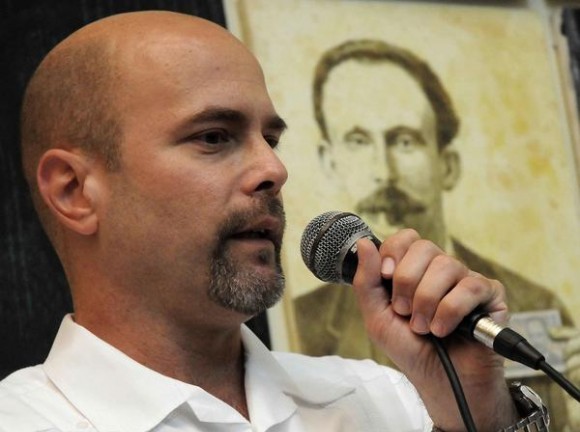 Gerardo Hernández
Nordelo,
Cuban anti-terrorist
hero and member of
the Cuban Five who spent sixteen years in prison in the U.S.,
will make his first visit to Canada in April. Gerardo will visit
a number of cities, including Montreal, Ottawa, Toronto and
Vancouver, meeting with friends of Cuba and discussing his time
as a political prisoner and subsequent developments.
Gerardo Hernández
Nordelo,
Cuban anti-terrorist
hero and member of
the Cuban Five who spent sixteen years in prison in the U.S.,
will make his first visit to Canada in April. Gerardo will visit
a number of cities, including Montreal, Ottawa, Toronto and
Vancouver, meeting with friends of Cuba and discussing his time
as a political prisoner and subsequent developments.
CPC(M-L) calls on Canadians to go all out to give Gerardo a hero's welcome and demonstrate the profound solidarity of the Canadian and Quebec people with revolutionary Cuba. The event in Toronto will take place April 3, with other cities to be announced shortly. Watch the Calendar of Events at the CPC(M-L) website for tour details as they are announced.
Argentinians Protest Visit of U.S. President
Social Movements Say "Obama, Macri Out!"

Mass protests took place throughout Argentina during the visit of U.S. President Barack Obama March 22-24. The final day of the visit fell on Argentina's Day of Remembrance for Truth and Justice, marking the anniversary of the U.S.-backed military coup which took place on March 24, 1976. Obama was originally scheduled to be present in the capital, Buenos Aires through the anniversary but changed his schedule after protests and instead spent most of the day in the city of Bariloche. Locals in Bariloche also came out to protest Obama's arrival.
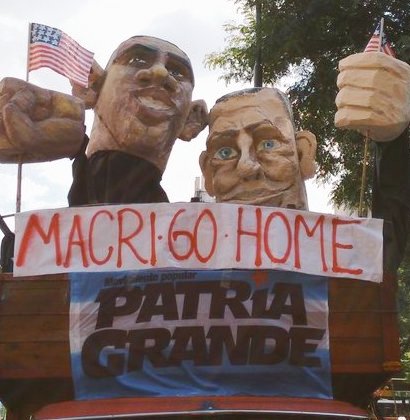 March 24 saw hundreds of
thousands of Argentinians take to the streets to commemorate the 30,000
plus victims of the U.S.-backed dictatorship and dirty war and to
condemn the neo-liberal government of Argentina's President Mauricio
Macri and ongoing U.S. interference in Argentina and Latin America.[1]
March 24 saw hundreds of
thousands of Argentinians take to the streets to commemorate the 30,000
plus victims of the U.S.-backed dictatorship and dirty war and to
condemn the neo-liberal government of Argentina's President Mauricio
Macri and ongoing U.S. interference in Argentina and Latin America.[1]
Before traveling to Bariloche, Obama issued a statement alongside Argentinian President Mauricio Macri at an event at Memorial Park in Buenos Aires. Obama paid tribute to those who struggled against the military dictatorship in Argentina but did not acknowledge the role that the U.S. government played in supporting it, nor did he apologize on behalf of the government. Organizations such as Mothers of the Plaza de Mayo, founded in 1977 to find the children stolen, kidnapped, or born to women in detention during the dirty war, announced that they would not attend the event.
Obama was dismissive in response to media questions
regarding the U.S. role in the region,
saying
"I don't want to go through every action carried out by the U.S.
in Latin America over the last 100 years. I suspect everybody
here already knows." He referred to the U.S. policy of backing
regimes that tortured, murdered and disappeared tens of thousands
as "counterproductive." "There is no shortage of self-criticism
in the United States. Certainly no shortage of criticism of its
President or its government or its foreign policy," he told
reporters.

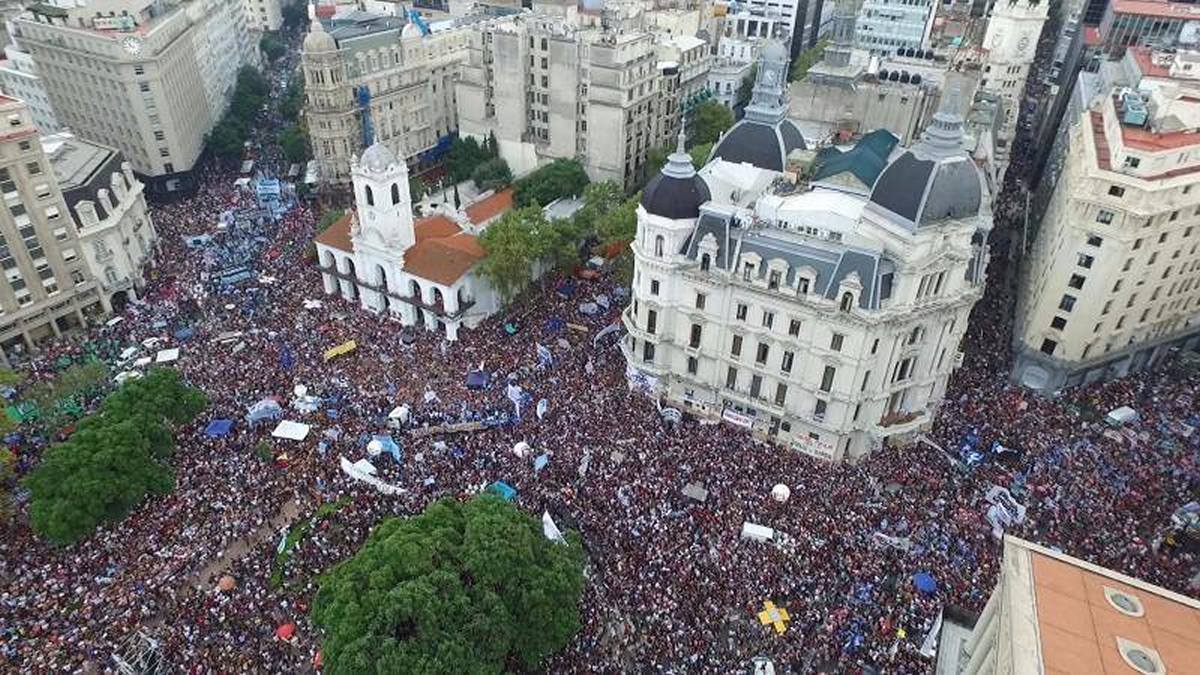
Statement of Argentinian Social Movements:
"Obama Out
of
Argentina"
Argentinian social movements issued a statement opposing the U.S. President's visit and the actions of the neo-liberal Macri government.
"We condemn the presence of U.S. President Barack Obama as head of the most powerful imperialist state on earth in our country, who together with other world powers and other reactionary forces is responsible not only for the vast majority of the sufferings of our people but of the peoples of the world.
"This is shown by the situation in Iraq, Afghanistan, Syria, Libya and many more countries that endure the direct or indirect military aggression of this power, which also has [other] secret prisons and torture centres such as the one it openly exhibits in Guantanamo.
"The date of Obama's visit coincides with the 40th anniversary of the coup of March 24, 1976, for which the U.S. was responsible together with other imperialist powers and reactionary forces in Argentina.
"This is therefore a provocation against the people which we cannot accept.
"Nor can we forget the role of [the U.S.] in support of British imperialism during the Falklands War.
"President Macri has agreed to this visit under an agreement between his government and U.S. Federal Judge Griesa and vulture funds, which represents a new twist to the mechanism of indebtedness and fraudulent looting, which is exactly what began under the dictatorship of Videla and Martinez Hoz, and then [was] ultimately validated [under] successive constitutional governments.
"Today we see that the national government as well as the provinces prepare to jump again into national debt and usury. While secret agreements such as YPF-Chevron continue to be signed and laws enacted such as the 'Terrorism Act,' new advances are also made in the field of 'security' and the Trans-Pacific Partnership treaty, which goes against the interests of the people and of Argentina.
"It is for all these reasons that we repudiate the visit of U.S. President Barack Obama and call for a mass mobilization on March 24, exactly 40 years after the genocidal coup, also in opposition to his presence in our country.
"Forty years after the genocidal coup, we are still fighting against impunity for the past and the present. Currently there are 30,000 disappeared detainees among our comrades.
"Obama out of Argentina! No to the agreement, No to looting and no to repression from Macri and provincial governments!"
Deals Made
One of the main reasons for Obama's visit was to promote U.S. monopoly interests in Argentina with a new Argentinian government which itself has close ties to the U.S. ruling elite. A number of government officials are themselves former CEOs who are looking to make deals for the benefit of private monopoly interests.
An agreement was signed between Obama and Macri before a joint press conference on March 23. Media reported that the agreement will, among other things, see Argentina recognize "intellectual property rights" on seeds, benefiting U.S. agro-industrial monopolies such as Monsanto. Argentina's small farmers have been fighting for years against demands of the monopolies that they pay "royalties" on seeds they themselves grew.
Another focus of the visit was to "jump-start collaboration on defense and security issues." The new Argentinian government has already signed agreements with U.S. federal security agencies on information exchanges and training, as well as the "war on drugs."
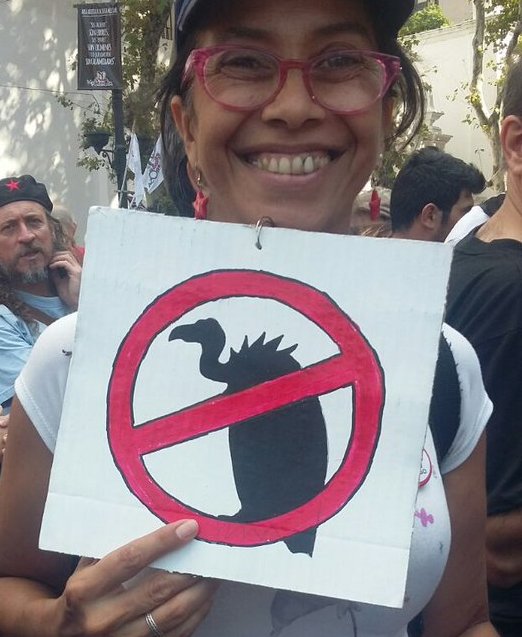 Obama also indicated
satisfaction with the Macri
government's
decision to pay nearly U.S.$5 billion in debts to four U.S. hedge
funds, plunging Argentina further into debt to international
moneylenders.[2]
"Sometimes, short-term pain and taking decisive action early is
the right thing to do, rather than putting it off to mañana, and
then you end up having a perpetual set of problems and you never
restore the kind of stability and trust that's necessary," Obama
said.
Obama also indicated
satisfaction with the Macri
government's
decision to pay nearly U.S.$5 billion in debts to four U.S. hedge
funds, plunging Argentina further into debt to international
moneylenders.[2]
"Sometimes, short-term pain and taking decisive action early is
the right thing to do, rather than putting it off to mañana, and
then you end up having a perpetual set of problems and you never
restore the kind of stability and trust that's necessary," Obama
said.
Obama further praised the neo-liberal economic policies implemented by the Macri government during its first 100 days in office. Dr. Alan B. Cibils, an economist from Buenos Aires told TeleSUR that such adulatory words were "unnecessary" and even "highly problematic" with the devastating impact of Macri's reforms on working people. Macri has brought about the "biggest transfer of income towards the rich sectors in the country's recent history," Cibils said.
Macri's policies, combined with the U.S. takeover of Argentina's markets, will have a devastating impact on the country's working class, in addition to the effects of the global recession on the whole continent, Cibils said. He pointed out that it is therefore not surprising that the financial news outlet Bloomberg recently carried the headline "Wall Street is in Charge in Argentina (Again)."
Notes
1. Besides other crimes committed against Argentina, the U.S. government is responsible for Operation Condor -- a campaign of political assassination and repression officially created in 1975 in Santiago, Chile by the ruling circles of Chile, Argentina, Uruguay and Brazil to eradicate socialist and communist influence and ideas and to eliminate opposition movements against the participating governments. The U.S. first proposed the plan for Condor in 1968, calling for "the coordinated employment of internal security forces within and among Latin American countries." Condor was responsible for a minimum of 60,000 deaths, 30,000 "disappearances," and 400,000 jailings.
2. The previous Argentinian government of Cristina Kirchner disputed the debts, which arose from Argentina's 2001 default on roughly $100 billion in bonds. Those bonds were part of the state debt stemming mostly from years under the military dictatorship and subsequent neo-liberal regimes, including the purchase of military equipment from the U.S. and Europe. The 2001 default led to debt swaps in 2005 and 2010, where international financial institutions agreed to swap the old bonds for new ones at a lower value. The hedge funds in question, commonly referred to as "vulture funds" bought old bonds at pennies on the dollar and refused the deal to swap them for new bonds, and demanded full payment of the old bonds. The Macri government has tabled proposals in the Argentinian parliament to settle the outstanding debts complying with a 2013 U.S. Supreme Court ruling which ordered the Argentine government to pay $1.5 billion in principal plus interest to two U.S. financial companies, NML Capital and Aurelius.
(TeleSUR, New York Times. Photos: TeleSUR, HIJOS Capital, FPDS)
17th Anniversary of
Criminal
U.S.-Led NATO
Bombing of Yugoslavia -- March 24, 1999
One of History's Great Infamies


Indiscriminate bombing of civilian targets by NATO included the Serbian
Ministry of the Interior (left) and Serbia Radio Television.
The U.S.-led NATO air war against the Federal Republic of Yugoslavia which began on March 24, 1999 will go down as one of history's great infamies. The attacks were launched by the U.S. to take over and control the Balkans and make sure it would not be controlled by either the Germans or the French. All the NATO powers participated in their collusion and contention with the U.S. imperialist striving for world domination. NATO used a well-prepared pretext based on lies that the Serbs were engaged in "ethnic cleansing" -- i.e. genocide -- of the Albanian Kosovars.
To Canada's everlasting shame, it whole-heartedly joined in the bombing of Yugoslavia and the crimes committed against the Serbian people and the peoples of the former Yugoslavia and the Balkans. Canada not only helped incite the lie of Kosovar genocide at the hands of bloodthirsty Serbs and to overthrow the government of Slobodan Milošević and imprison him and try him under false accusations, it provided refuge to many who were forced to flee their country in the name of escaping the alleged crimes against humanity which it was subsequently proven beyond the shadow of any doubt never took place. This is the "Canada, A Land of Refuge" which is so proudly proclaimed by successive Canadian governments which have yet to take responsibility for their part in the crimes committed to destroy the former Yugoslavia. Canada also subsequently gave rise to the "responsibility to protect" doctrine to commit more crimes of a similar nature since then.
The order to bomb Yugoslavia was given to NATO's commander at the time, U.S. General Wesley Clark by then-NATO Secretary General Javier Solana without the approval of the UN Security Council. This represented a precedent at the time. Clark later wrote in his book entitled Modern Warfare that the planning of the war was already underway mid-June 1998 and was completed that August.
The pretext for the attack was that Serbia was responsible for a "humanitarian catastrophe in Kosovo" and that Milošević refused to cooperate in the negotiations in Rambouillet, Paris on the future status of Serbia. The Rambouillet "negotiations" presented Serbia with the "choice" to voluntarily have foreign troops deployed in its territory or be invaded. President Milošević's decision not to accept foreign troops was confirmed by the Serbian Assembly, following which, on March 24, 1999, NATO launched its murderous attacks.
Nineteen countries including Canada took part in the operation, using ships in the Adriatic Sea and four air bases in Italy, supported by strategic operators who took off from bases in western Europe.
According to estimates of the Serbian government, at least 2,500 people were killed (according to some sources, the total number of fatalities was almost 4,000), while more than 12,500 were injured.
The recently published official data of the Ministry of Defence of Serbia speaks about 1,008 soldiers and policemen killed, while unofficial data shows that 6,000 civilians, including 2,700 children, suffered various degrees of injuries.


Left: heating plant in Belgrade bombed by NATO; right: a bombed bridge
in Novi Sad.
- The total damage done to the country's economy and infrastructure was estimated at the time at U.S.$100 billion.
- NATO military losses in manpower and technology have never been disclosed.
- The Museum of Aviation in Belgrade displays parts of the destroyed F-117 and F-16 aircraft, UAVs, and cruise missiles.
- Almost all cities in Serbia came under attack several times during the war that lasted 11 weeks.
- The bombing destroyed and damaged 25,000 housing units, 470 km of roads and 595 kilometres of railways.
- The attacks also damaged 14 airports, 19 hospitals, 20 health centres, 18 kindergartens, 69 schools, 176 cultural monuments and 44 bridges, while 38 were destroyed.
- During the aggression NATO carried out 2,300 air strikes on 995 facilities across the country, while 1,150 combat aircraft launched nearly 420,000 missiles.
- NATO also launched 1,300 cruise missiles, dropped over 37,000 cluster bombs that killed some 200 people and wounded hundreds, and used prohibited ammunition with depleted uranium.
- A third of the power capacity of the country was destroyed, two oil refineries in Pancevo and Novi Sad were bombed, while NATO forces used the opportunity to deploy the so-called graphite bombs for the first time to disable the power system.
After several attempts to end the war by diplomatic means, the bombing ended with the signing of the Military Technical Agreement in Kumanovo on June 9, 1999, after which the Yugoslav Army and Serbian police started withdrawing from Kosovo and Metohija.
A day later, the UN Security Council adopted Resolution 1244, and some 37,200 NATO-led KFOR troops from 36 countries were deployed in Kosovo with the task of "keeping the peace, security, and ensuring the return of refugees until the widest degree of autonomy was defined for the territory."
Serbian Prime Minister's Remarks at Remembrance Day Ceremony
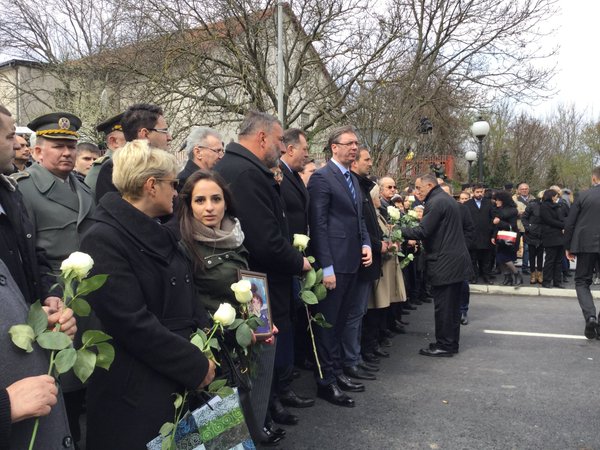 Prime Minister Aleksandar
Vučić of Serbia addressed the
central state ceremony to mark Remembrance Day dedicated to the
victims of NATO's bombing campaign that started on March 24,
1999. The ceremony was held in Varvarin, where on May 30, 1999,
NATO air strikes on a bridge across the Velika Morava River
killed ten citizens, seriously wounding 17 others. "An aggression
was launched against the Republic of Serbia, the first bombs
fell, and continued to fall for the next 78 days, killing and
destroying. They were killing citizens of Serbia, trying to kill
Serbia... the night 17 years ago will be remembered forever, we
are today saying proudly, standing tall, in a sad and quiet
voice, but clearly: you were killing us, you were killing our
children, but you did not kill Serbia because nobody can," said Vučić.
Prime Minister Aleksandar
Vučić of Serbia addressed the
central state ceremony to mark Remembrance Day dedicated to the
victims of NATO's bombing campaign that started on March 24,
1999. The ceremony was held in Varvarin, where on May 30, 1999,
NATO air strikes on a bridge across the Velika Morava River
killed ten citizens, seriously wounding 17 others. "An aggression
was launched against the Republic of Serbia, the first bombs
fell, and continued to fall for the next 78 days, killing and
destroying. They were killing citizens of Serbia, trying to kill
Serbia... the night 17 years ago will be remembered forever, we
are today saying proudly, standing tall, in a sad and quiet
voice, but clearly: you were killing us, you were killing our
children, but you did not kill Serbia because nobody can," said Vučić.
He then addressed the families of victims:
"We can only kneel before you, bow our heads, we who are indebted, to be silent at least for a moment ... Forgive, if you can, also those who do not know how to ask for forgiveness, those who did the killing, without knowing how to say 'I'm sorry.' They never wanted to see the spasm on our faces. That was an aggression of 19 powerful countries, senseless and needless, one of those carnages that destroy everything without solving anything."
According to the prime minister, every war is a crime that has no justification, explanation, reason or sense.
"There is only a warning both to them and to us -- to them that they will have to, at least in front of God, tell about all the victims, they will have to say that blood was blood, not a coincidence or collateral damage. Those were children, not the fight for democracy and freedom. God may forgive them, we have, but we have not forgotten," said Vučić.
He then referenced the Crusades and "the killing of the entire town of Beziers," when a papal legate said, "Kill them all -- surely the Lord discerns which ones are his," and added, "That's what used to be said, now it is said this is collateral damage."
Besides the families of the victims, the survivors, and the prime minister, the commemoration was attended by Serbian government ministers, National Assembly President Maja Gojković, Republika Srpska President Milorad Dodik, and others.
(With files from Ministry of Defence of Serbia, B92.net. Photos: Tanjug, A. Vučić)
Statement of CPC(M-L), March 25, 1999
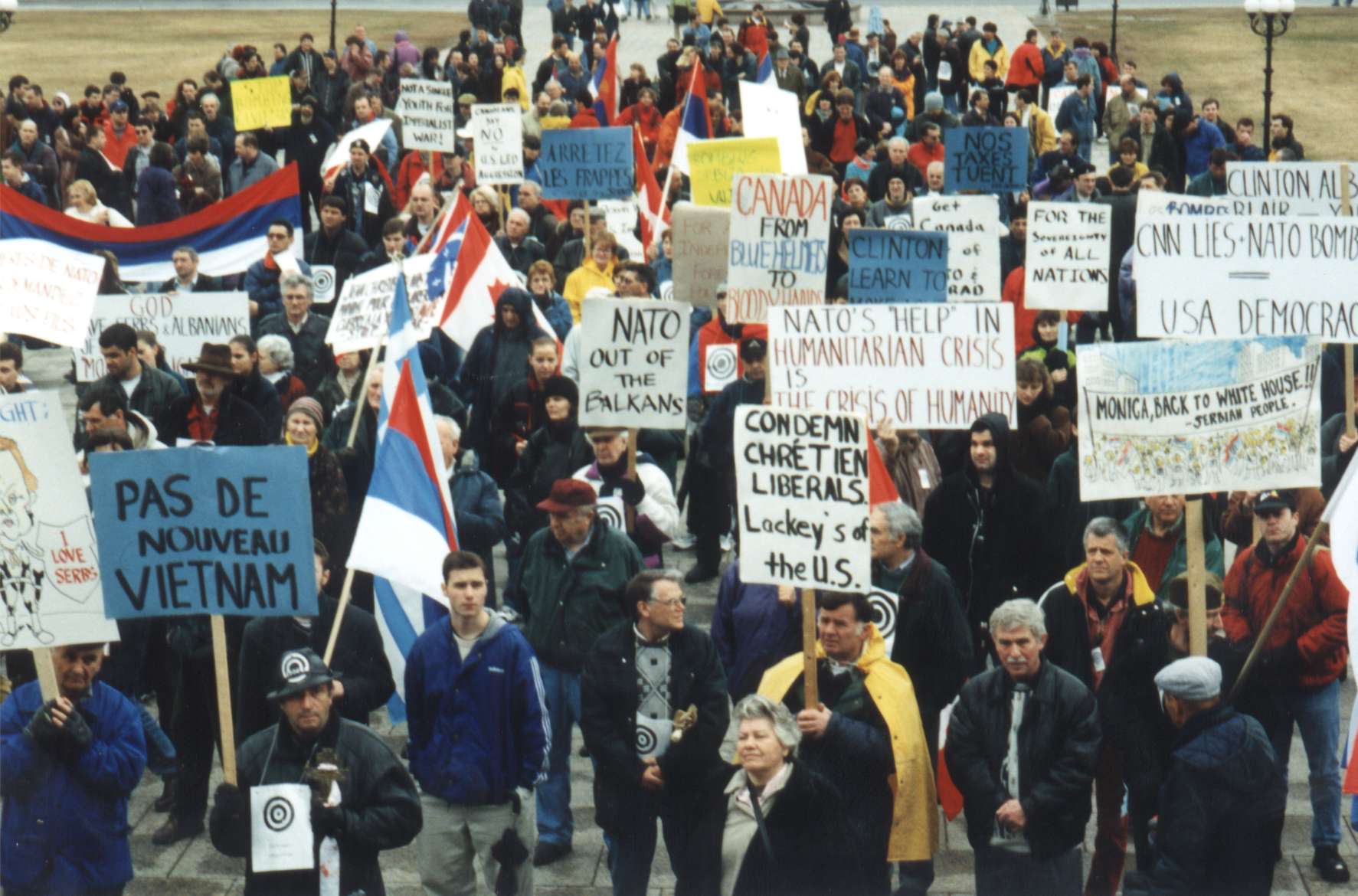
Ottawa demonstration against NATO bombing of Serbia, April 17, 1999.
Vigorously Condemn
NATO's Aggression Against Yugoslavia!
End
Canadian Involvement Now! Demand that NATO Be Dismantled!
The Communist Party of Canada (Marxist-Leninist) vigorously condemns the criminal aggression unleashed against Yugoslavia by the aggressive NATO military alliance under the auspices of the U.S. imperialists and other big powers. CPC(M-L) condemns the Chrétien Liberals for involving Canadian planes and forces in this criminal action and demands that Canadian forces be immediately withdrawn, that Canada get out of NATO and that NATO be dismantled.
 Canada calls itself a peace-loving
nation. It presently
has
the chair of the Security Council. It is duty-bound to support
the established principles of international law. This means
Canada must oppose the use of force or threat of the use of force
in international affairs, foreign interference into the internal
affairs of sovereign nations, and the creation of pretexts under
the guise of high ideals to justify what cannot be justified.
Canada calls itself a peace-loving
nation. It presently
has
the chair of the Security Council. It is duty-bound to support
the established principles of international law. This means
Canada must oppose the use of force or threat of the use of force
in international affairs, foreign interference into the internal
affairs of sovereign nations, and the creation of pretexts under
the guise of high ideals to justify what cannot be justified.
This aggression under the auspices of NATO marks the first time in its fifty-year history as an aggressive military alliance that NATO has attacked a sovereign country in outright violation of established principles and international law. The use of NATO is also to circumvent the United Nations Security Council so as to bypass the veto power of both Russia and China which oppose the use of force against Yugoslavia. Furthermore, historically the control of the Balkans has been central to the control of Europe. The U.S. is seeking to establish its hegemony over all of Europe, while the other big powers in Europe, especially Britain, Germany and France are seeking to establish their own prerogatives over Europe in contention with U.S. imperialism. The contention of the big powers over control of the Balkans so as to control Europe escalated into World War One. They are seriously endangering the cause of world peace once again, besides committing barbaric crimes against the peoples of the region.
 CPC(M-L) also calls on the
Canadian workers, women and
youth
to condemn the Hitlerite propaganda of the U.S. imperialist
chieftain William Clinton and the likes of Tony Blair and Jean
Chrétien who declare that the aggression is a "moral imperative"
to "bring peace and stability" to the region, "avert a human
catastrophe" and "defend human rights." It is the interference of
the big powers which is behind the suffering of the peoples of
the region. They are the ones which finance, arm and incite
different factions so as to make sure their interests are
served.
CPC(M-L) also calls on the
Canadian workers, women and
youth
to condemn the Hitlerite propaganda of the U.S. imperialist
chieftain William Clinton and the likes of Tony Blair and Jean
Chrétien who declare that the aggression is a "moral imperative"
to "bring peace and stability" to the region, "avert a human
catastrophe" and "defend human rights." It is the interference of
the big powers which is behind the suffering of the peoples of
the region. They are the ones which finance, arm and incite
different factions so as to make sure their interests are
served.
A precondition for peace in the region is to demand that the big powers withdraw from the region and leave the peoples to sort out their affairs themselves. It is a big lie that when the peoples are left to sort out their own problems themselves, they resort to fratricidal war; it is an integral part of the Hitlerite technique that if you repeat a lie often enough, it will be believed. It is important that the Canadian people think things out for themselves and take an active stand in opposing these Hitlerite lies and the use of pretexts to carry out wanton aggression and slaughter and create the conditions for a third world war. The peoples of the Balkans played an extremely heroic role during World War Two against fascist aggression, contributing in no small way to defeating the axis powers and bringing the war to an end.
It is the peoples who are decisive in establishing peace and they must be left alone to sort out their problems themselves. So long as the peoples play a passive role, the big powers will continue to dictate their fate and create the danger of another slaughter of world wide proportions. Peace will only come to the Balkans when all the imperialist forces are thrown out of the region and the peoples are left to settle their affairs themselves without foreign interference.
Demonstrate against this aggression and Canada's involvement and demand that the norms of international relations be upheld by Canada!
NATO and All Foreign Powers, Out of the
Balkans!
End
Canadian Involvement Now!
Leave the Peoples of the Balkans to
Settle Their Own Affairs!
Get Canada Out of NATO! Dismantle
NATO!
Anti-War Actions on 13th Anniversary of U.S. Invasion of Iraq
Actions Demand End to Canada's Participation in Aggressive Wars and Occupation

Ottawa, March 19, 2016
Demonstrations were held in cities across Canada on March 19, the 13th anniversary of the 2003 U.S. invasion of Iraq and the fifth anniversary of the start of the 2011 NATO war against Libya. The main demands of the demonstrations were that the Liberal government bring all troops home from Syria, Iraq and other countries and for Canada to end its participation in U.S./NATO wars of aggression and occupation.
Demonstrations also raised the need for Canada to cease
its
interference in the sovereign affairs of Syria, Libya, Ukraine and
Haiti and to end support for the Israeli occupation of Palestine
and that Canada needs an anti-war government. Speakers at various
demonstrations noted the significance of the use of pretexts to
give the appearance of legitimacy to wars of aggression, a major
feature of the lead-up to the attacks on Iraq and Libya. They
noted that it is important for Canadians to understand how such
pretexts are used to ensure that war is not waged in their name,
including under the guise of peacekeeping.
Halifax

Montreal










Ottawa






Sudbury
Toronto
Windsor


Edmonton





Vancouver



(Photos: TML, MAWO)
Website: www.cpcml.ca Email: editor@cpcml.ca
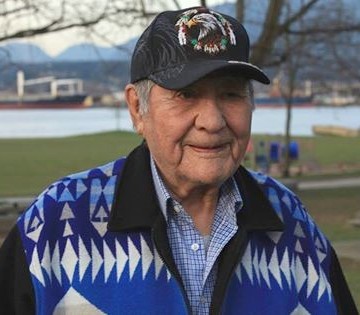




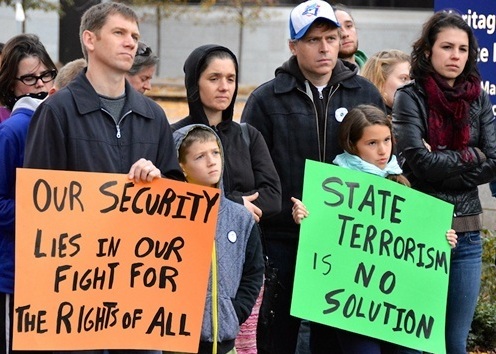 CPC(M-L) rejects all forms
of terrorism, both state
terrorism
and individual acts of terror. CPC(M-L) also condemns the use of
such events as a pretext to step up imperialist war preparations,
invasions and aggression to bring about "regime change." We call
on Canadians to also oppose all actions by the big powers which
criminalize the right to conscience of human beings in the name
of defending security, opposing "radicalization," defending
civilized values and other pretexts.
CPC(M-L) rejects all forms
of terrorism, both state
terrorism
and individual acts of terror. CPC(M-L) also condemns the use of
such events as a pretext to step up imperialist war preparations,
invasions and aggression to bring about "regime change." We call
on Canadians to also oppose all actions by the big powers which
criminalize the right to conscience of human beings in the name
of defending security, opposing "radicalization," defending
civilized values and other pretexts.
 "Public debt to private
mostly international institutional
lenders has no reason to exist. It has become an enforced form of
tribute within the U.S.-led imperialist system of states. Some
Canadians contend this form of tribute paid as a consequence of
private lending to governments is illegal and have launched a
lawsuit to prohibit the practice. They argue that the
publicly-owned Bank of Canada by law is obligated to provide
loans to governments at low or zero-interest rates, as was
practiced from 1938 to 1974."[
"Public debt to private
mostly international institutional
lenders has no reason to exist. It has become an enforced form of
tribute within the U.S.-led imperialist system of states. Some
Canadians contend this form of tribute paid as a consequence of
private lending to governments is illegal and have launched a
lawsuit to prohibit the practice. They argue that the
publicly-owned Bank of Canada by law is obligated to provide
loans to governments at low or zero-interest rates, as was
practiced from 1938 to 1974."[ The programs to be scrapped include
the Canada Child Tax
Benefit, the National Child Benefit Supplement, the Universal
Child Care Benefit, the Children's Fitness Tax Credit and the
Children's Arts Tax Credit, and Income tax Splitting for Couples
with Children. The elimination of these programs claws back all
but around $4 billion a year of any increase in the Canada Child
Benefit.
The programs to be scrapped include
the Canada Child Tax
Benefit, the National Child Benefit Supplement, the Universal
Child Care Benefit, the Children's Fitness Tax Credit and the
Children's Arts Tax Credit, and Income tax Splitting for Couples
with Children. The elimination of these programs claws back all
but around $4 billion a year of any increase in the Canada Child
Benefit.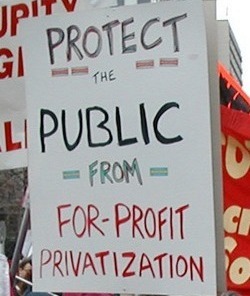 Pro-social renewal also
demands increased investments
in
social programs and public services and an end to privatizations
and public-private partnerships, which are a source of official
corruption and means to channel public collective wealth to
owners of social wealth and the monopolies, and to depress the
individual and social reproduced-value of the working class.
Under the current outmoded system, taxes are taken by the ruling
imperialist elite in control of the state and used for whatever
purposes they want such as pay-the-rich schemes, repression of
the working class, war preparations and predatory wars.
Pro-social renewal also
demands increased investments
in
social programs and public services and an end to privatizations
and public-private partnerships, which are a source of official
corruption and means to channel public collective wealth to
owners of social wealth and the monopolies, and to depress the
individual and social reproduced-value of the working class.
Under the current outmoded system, taxes are taken by the ruling
imperialist elite in control of the state and used for whatever
purposes they want such as pay-the-rich schemes, repression of
the working class, war preparations and predatory wars.
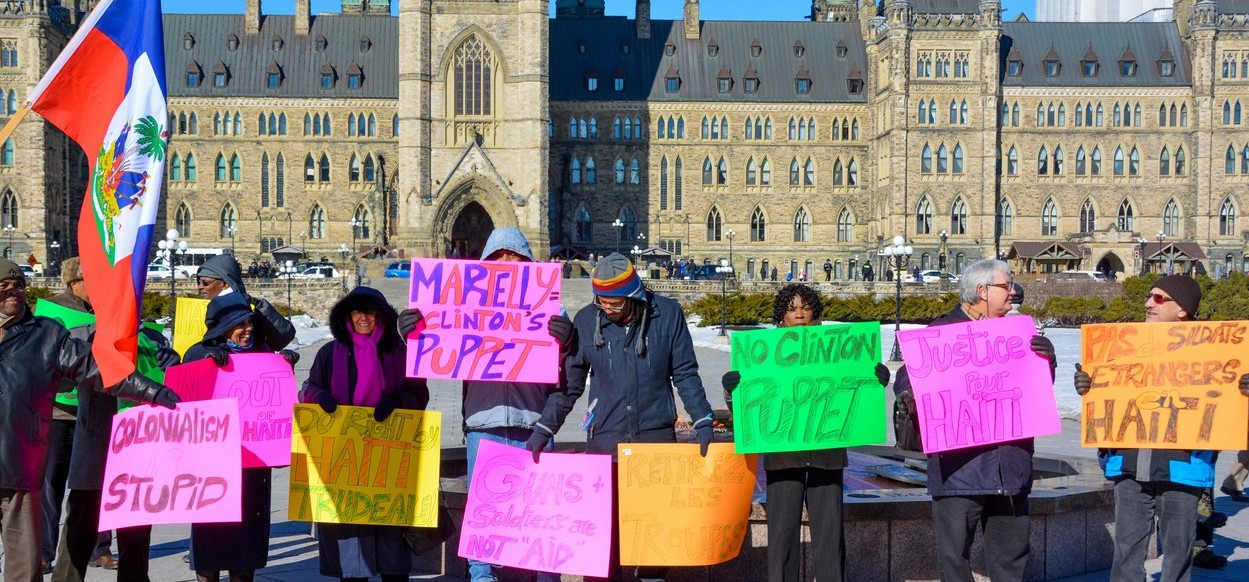
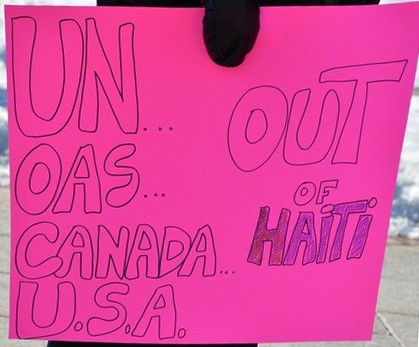 The report comes at a time
when Haitians have succeeded in blocking a corrupt electoral process
funded and overseen by the U.S., Canada and other powers that make up
the "Core Group" that sought to prevent them from exercising their
right to determine their own affairs. Now they are demanding an
accounting of the electoral fraud that took place and an end to foreign
interference while the U.S. and its allies want to simply hold another
Presidential vote and prevent the people from consolidating their
victory. Through their actions Haitians are demanding an end to the
occupation of their country and all foreign interference. Together with
Grenada and Honduras which were also subjected to U.S.
The report comes at a time
when Haitians have succeeded in blocking a corrupt electoral process
funded and overseen by the U.S., Canada and other powers that make up
the "Core Group" that sought to prevent them from exercising their
right to determine their own affairs. Now they are demanding an
accounting of the electoral fraud that took place and an end to foreign
interference while the U.S. and its allies want to simply hold another
Presidential vote and prevent the people from consolidating their
victory. Through their actions Haitians are demanding an end to the
occupation of their country and all foreign interference. Together with
Grenada and Honduras which were also subjected to U.S. 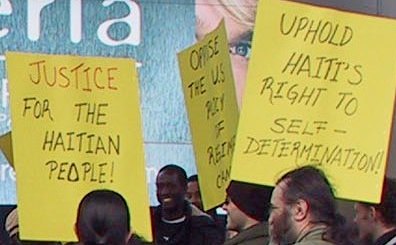 Among the government's pretexts for
increasing
Canada's
military
presence in Haiti and other countries is a cynical reference to the
number of French speakers within Canada, particularly Quebeckers.
Everyone from spokespersons for the UN mission in Haiti to
Secretary-General Ban Ki-moon to Prime Minister Trudeau himself
have noted that French speakers make Canada "well placed" for
such military interventions. Le Devoir characterized Haiti
as an "ideal landing place for Canada."
Among the government's pretexts for
increasing
Canada's
military
presence in Haiti and other countries is a cynical reference to the
number of French speakers within Canada, particularly Quebeckers.
Everyone from spokespersons for the UN mission in Haiti to
Secretary-General Ban Ki-moon to Prime Minister Trudeau himself
have noted that French speakers make Canada "well placed" for
such military interventions. Le Devoir characterized Haiti
as an "ideal landing place for Canada."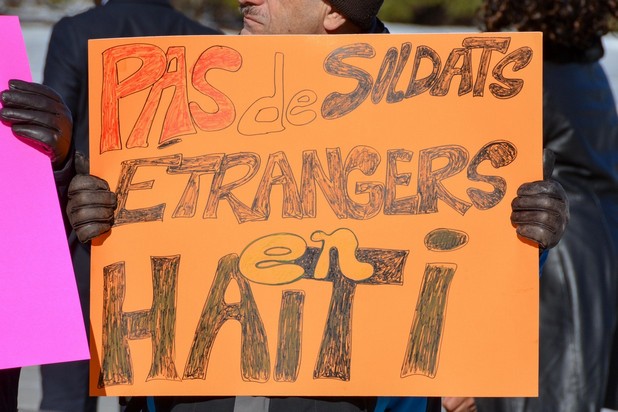 The MINUSTAH force was
installed in Haiti in support
of a
U.S., French and Canadian-backed coup in 2004. It was established
by the UN Security Council against the will of the Haitian people
and has been accused of atrocities against civilians alongside
the Haitian National Police and paramilitary forces. In early
2005, the top Brazilian commander of the UN force, General
Augusto Heleno Ribeiro, testified before a congressional
commission in Brazil that MINUSTAH is "under extreme pressure
from the international community to use violence," and cited the
U.S., France and Canada.
The MINUSTAH force was
installed in Haiti in support
of a
U.S., French and Canadian-backed coup in 2004. It was established
by the UN Security Council against the will of the Haitian people
and has been accused of atrocities against civilians alongside
the Haitian National Police and paramilitary forces. In early
2005, the top Brazilian commander of the UN force, General
Augusto Heleno Ribeiro, testified before a congressional
commission in Brazil that MINUSTAH is "under extreme pressure
from the international community to use violence," and cited the
U.S., France and Canada. The Coalition of Haitians
in Montreal
Against the Occupation
of Haiti (REHMONCO) vigorously denounces and condemns the Liberal
government's decision, under the direction of Prime Minister
Justin Trudeau, to reinforce the military occupation of Haiti.
According to
The Coalition of Haitians
in Montreal
Against the Occupation
of Haiti (REHMONCO) vigorously denounces and condemns the Liberal
government's decision, under the direction of Prime Minister
Justin Trudeau, to reinforce the military occupation of Haiti.
According to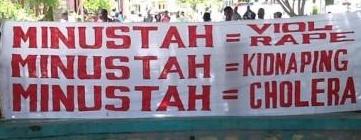 All of this criminal
extortion has been committed with
total
impunity, without even a formal condemnation from the United
Nations. The systematic refusal of the UN to compensate the
cholera victims clearly demonstrates the flagrant contempt for
the Haitian people by the so-called international community. A
more profound act of contempt, stated unequivocally by many
institutions (including Harvard University) is the responsibility
of MINUSTAH troops for introducing the epidemic.
All of this criminal
extortion has been committed with
total
impunity, without even a formal condemnation from the United
Nations. The systematic refusal of the UN to compensate the
cholera victims clearly demonstrates the flagrant contempt for
the Haitian people by the so-called international community. A
more profound act of contempt, stated unequivocally by many
institutions (including Harvard University) is the responsibility
of MINUSTAH troops for introducing the epidemic.